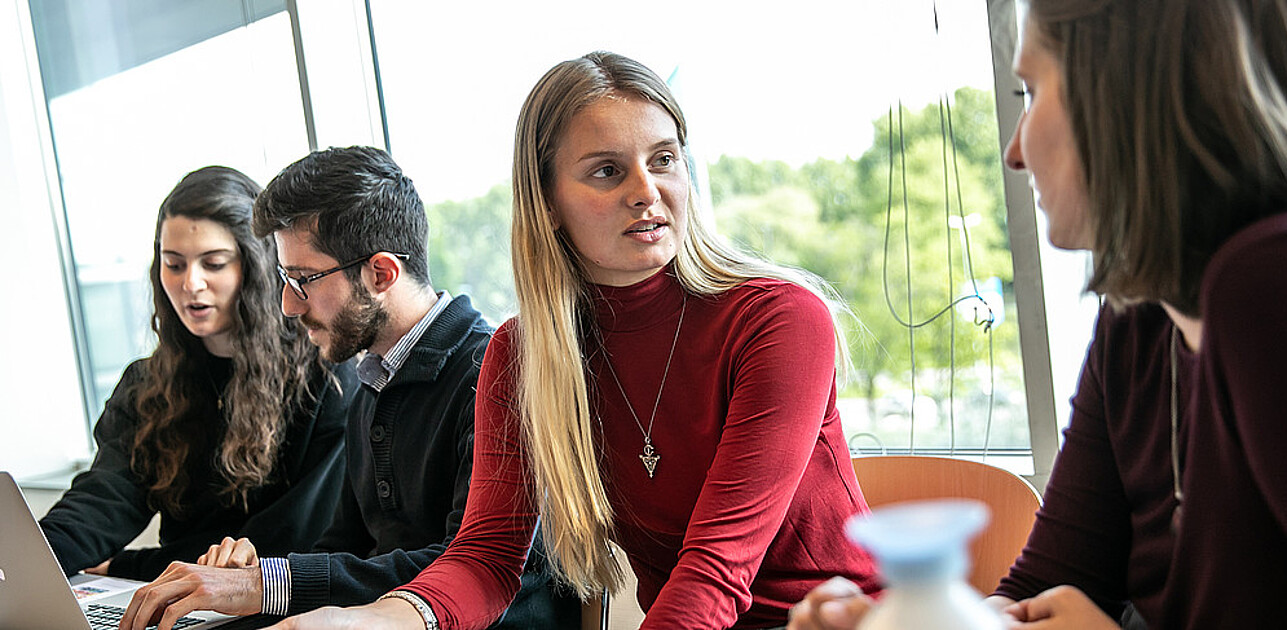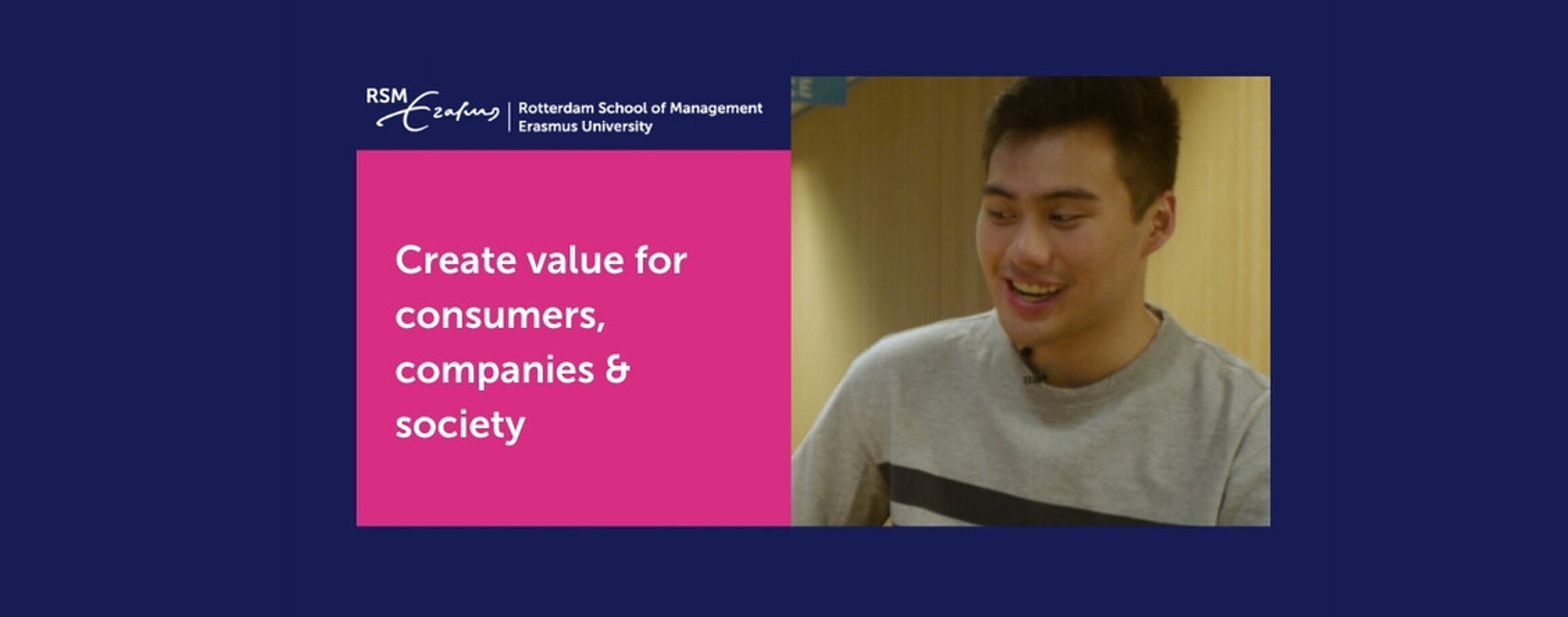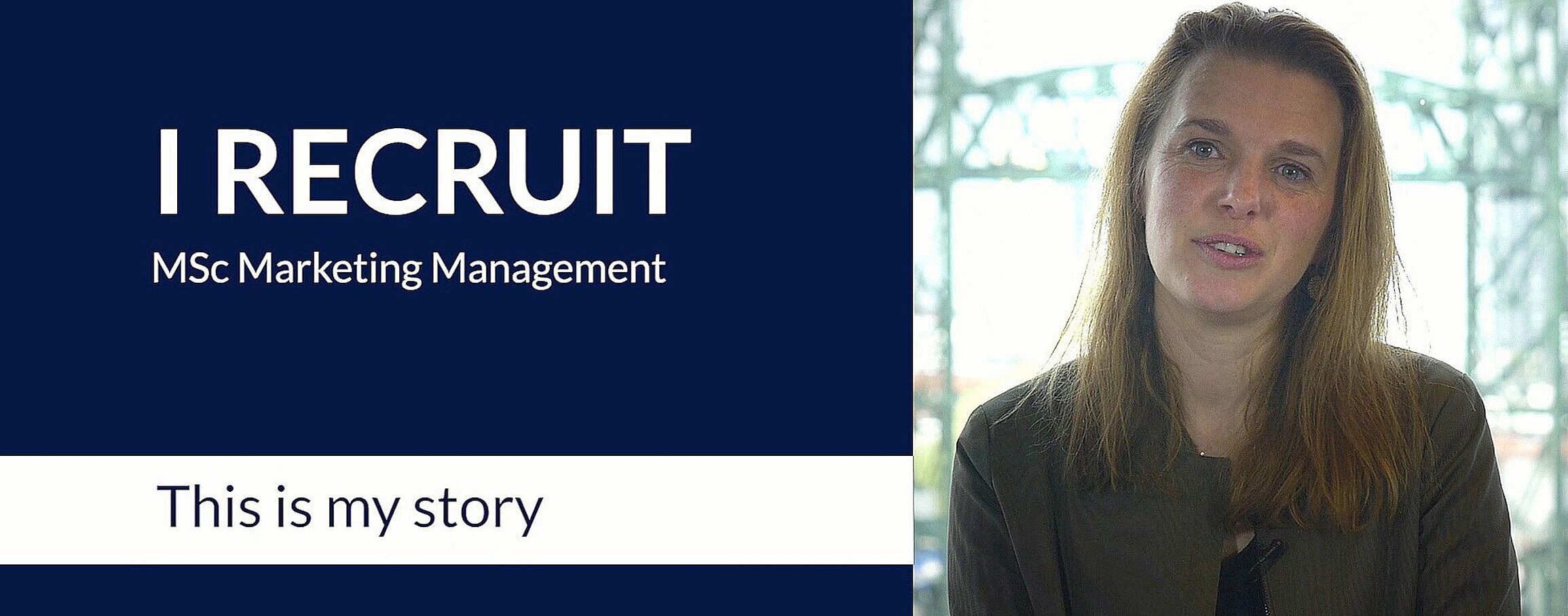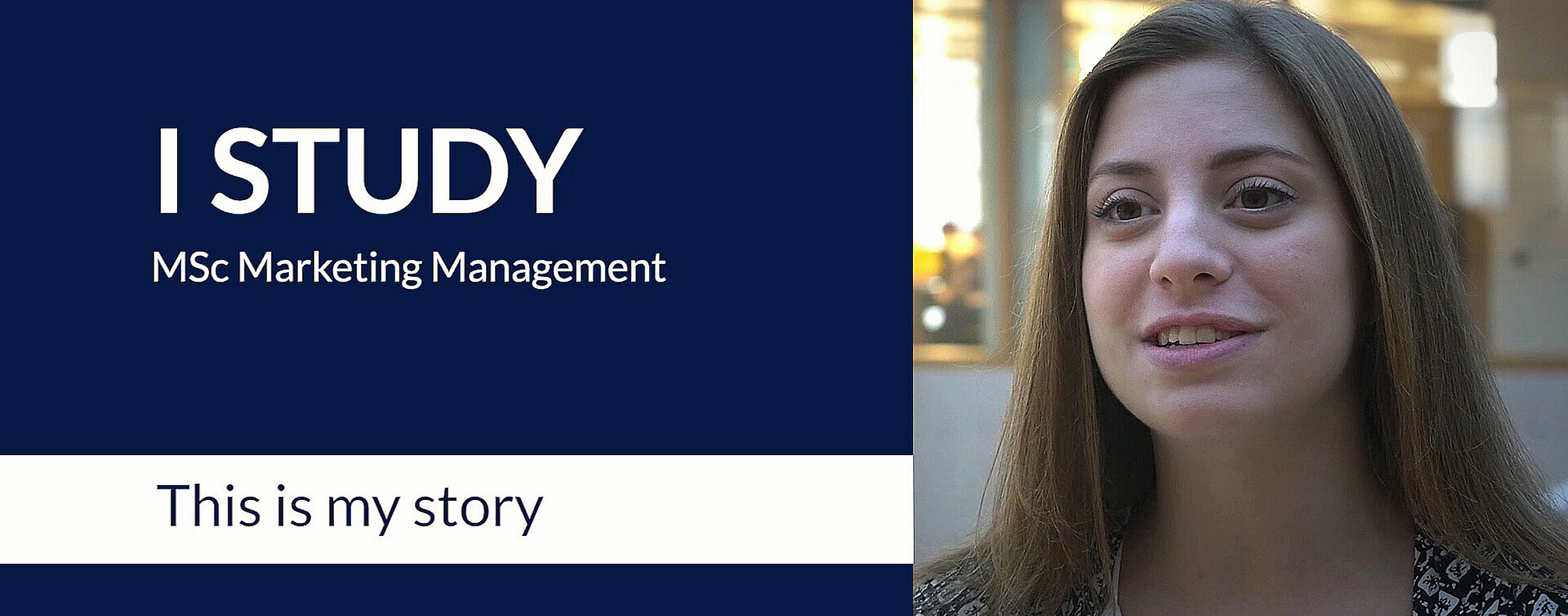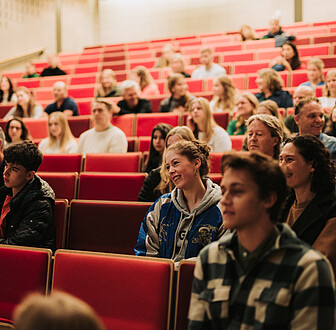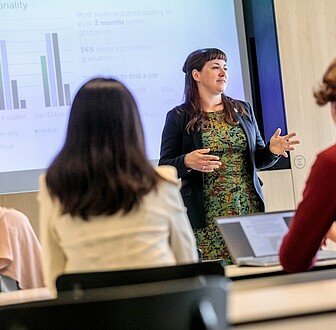Do you want to know more about the MSc Marketing Management programme?
The video below will answer the most frequently asked questions about the programme.
Overview
During the 12-month MSc in Marketing Management programme, you’ll develop into an all-round marketing specialist, with a specialisation in your chosen elective track. You’ll follow the compulsory core courses (22 EC) in the autumn semester. Then you’ll choose your master electives (18 EC) in the spring semester. In addition to your coursework, you will also work on your master thesis project (20 EC) throughout the year.
MSc programmes are often associated with a research group, guided by accomplished researchers making meaningful contributions in their respective fields. For a closer look at the exciting research initiatives by our academic faculty, we encourage you to explore the department of Marketing Management.
Please note that core courses and electives are subject to change each academic year. While some electives are very popular and we can place most students in the elective(s) of their choice, there are no guaranteed places.
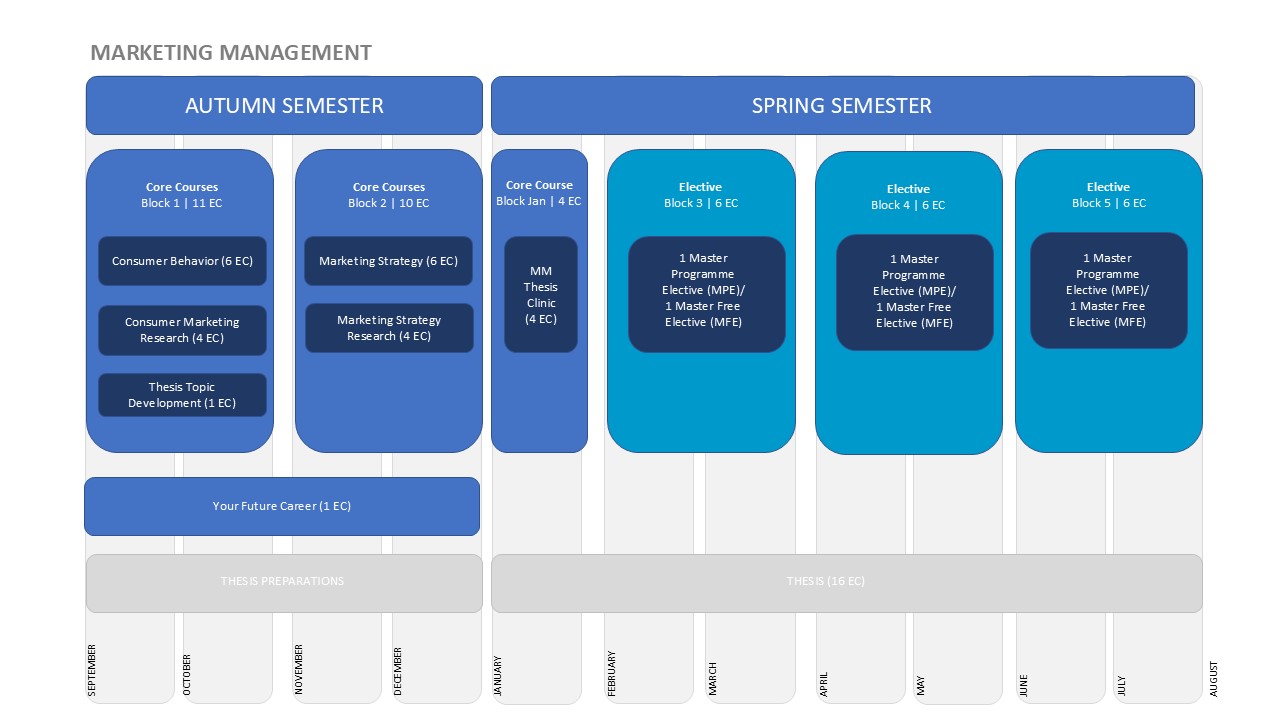
In your four initial core courses, you’ll learn a strong foundation upon which you can build your career-defining specialisation during the spring semester. These core courses cover:
• Consumer Behaviour
• Consumer Marketing Research
• Marketing Strategy Research
• Marketing Strategy
Focusing first on consumers, you’ll develop a deep understanding of consumer psychology and behaviour and their relevance to managerial practice. You’ll then learn how to use research to understand more consumer actions and motivations. Ultimately, you will focus on managerial decision-making as we cover key concepts in marketing strategy and research-based decision-making in the last two core courses.
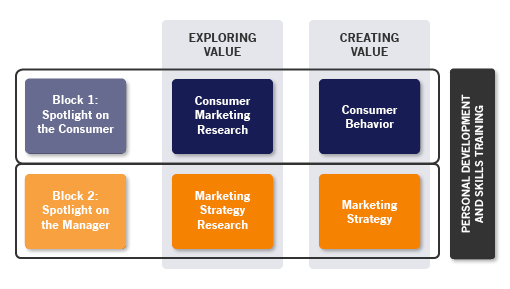
There are two elective* tracks available in the MSc Marketing Management, and you can create your own study plan too:
Brand & Product Management elective track
This track prepares you for a career in brand and product management. It includes well-established foundation topics such as communication and branding, and recently emerging topics such as neuromarketing and nudging consumer choice. This track is for you if you’d like to become a brand manager, product manager, category manager, or work in similar positions in B2C and B2B companies. The track can also prepare you to work for governmental agencies and NGOs in communications and consumer welfare.
Digital Marketing & Analytics elective track
This track trains you to become a marketer in digital marketing. Given the important role of new customer and data analytics in digital marketing, it emphasises new techniques for generating more knowledge about your customers. The track prepares you to work in positions related to mobile marketing, social media, emerging technologies, platform economics, and general technology.
Individual Study Plan elective track
You can also create a personalised study plan to pursue your goals and aspirations. If you select your own study plan, you can choose any marketing electives from the programme’s brand and product management track or digital marketing and analysis track. You can also choose an elective offered by other MSc programmes at RSM, but no more than one non-marketing elective.
Example of the electives courses available:
- International Product Management (B&PM)
- Neuromarketing (B&PM and DM&A)
- Brand Development (B&PM)
- Customer Experience Management (B&PM)
*Please note that certain electives may be very popular. Although we can place most students in the elective(s) of their choice, there are no guaranteed places.
For a detailed description of all of the courses, please view the course catalogue (for reference only, catalogue continually updated throughout the year).
In addition to your coursework, you will also work on your master thesis project, worth a total of 20 EC, throughout the year. This is a piece of empirical research to develop and examine a research question based on your own interests. You will work independently on this project, and it represents a major part of your degree programme. You can dig deep into your chosen topic at the same time as improving your skills in academic writing, empirical methods, and project management. Check out the Erasmus University Thesis Repository for examples of theses our alumni have written.
Learn more
A group of between 20-25 students will be selected to follow an additional course that runs across the third, fourth and fifth study blocks. During these selective honours class sessions, honours students will discuss recent themes in marketing with faculty members and marketing practitioners in prominent positions. Subjects might include international marketing, branding, marketing operations, word-of-mouth recommendations and social media. This brings real applications of marketing practice into our highly interactive honours sessions, showing how science and practice are integrated. The honours class is concluded by writing a paper on one of the topics.
Explore the world and broaden your study experiences by going on international study trips and exchanges at other top schools. RSM has an extensive partner school network of more than 100 business schools and universities worldwide, including top business schools such as ESADE in Barcelona and The Wharton School in the USA. An international exchange is an optional element after you’ve studied for your master for at least one year.
As a graduate of RSM’s MSc in Marketing Management, you can pursue a career as a product or brand manager, market researcher, marketing management trainee, account manager, media planner, category manager, advertising strategist, or one of many other related positions. From these positions, graduates can progress to more senior-level positions. Marketing holds such importance for top management decisions, so the MSc Marketing Management is excellent preparation for a management career.
Graduates work as:
- brand or product managers for large multinationals such as Procter & Gamble, Unilever, Henkel, Coca-Cola, and Beiersdorf
- strategy or account managers in advertising agencies such as J. Walter Thompson and BBDO
- category manager within BP Retail and Ahold
- marketing consultants with Accenture, VODW and Arthur Andersen.
Curious to see what our alumni are doing?
Good to know
Non-EEA nationals who have earned a diploma from a higher education institute in the Netherlands can apply for a special residence permit called the orientation year after completing their studies. The 'Orientation Year for Graduates Seeking Employment' is a residence permit aimed at retaining foreign talent for the Dutch labour market. During this orientation year you are free to work without a work permit. Participants who find a job during this period can change their orientation year into a residence permit for Highly Skilled Migrants under more favourable terms.
For the most up-to-date information please visit the following website.
What's next after your studies? The RSM Career Centre is your guide for an impactful career. Its expertise in the labour market, personal branding and connections with employers will prepare you for your business career. Get ready for some exciting job fairs, workshops, speed interviews and coaching. You may land your first internship or job before you even graduate!
You’re a member of the RSM community from Day 1. After you graduate, you’ll also be a member of the RSM alumni network. The countless benefits include networking events worldwide with local chapters, lifelong learning and professional development, mentoring opportunities and access to the latest business knowledge and research. Your study at RSM is the first step towards being part of this inspiring community that you’ll be part of forever.
Talk to our current students!
The 2026-2027 tuition fee for the MSc programmes is approximately €25,800 for non-EEA students. The Dutch government contributes towards this cost for students who hold a nationality from a country belonging to the European Economic Area (EEA). These students therefore only pay the statutory fee €2,695 in 2026-2027.
For EEA nationals who have already completed a master in the Netherlands (and obtained the diploma) the tuition fee for a 2nd master is approximately €14,800.
Please note that all these tuition fee tariffs are subject to change.
There are other costs associated with the Master programmes, for more information please review the “Other expenses” section below thoroughly.
Scholarships
The number of scholarships is limited and mainly merit based. If a scholarship covers only the tuition fees, be aware that you need to finance your own living expenses (rent, food and insurances) for the duration of your studies. RSM does not offer scholarships for the pre-master programme. We do however offer a maximum of 2 scholarships per academic year to RSM pre-master students enrolling in an MSc programme.
Rotterdam School of Management, Erasmus University (RSM) offers multiple scholarships to prospective students from non-EEA countries who are not entitled to pay the EEA tuition fee, provided their grades are considered ‘excellent’. RSM also offers one scholarship, the Erasmus Trustfonds Scholarship, to students from EEA countries.
Besides scholarships awarded by RSM, there are also scholarships awarded by the Dutch government or other organisations that are available if you meet certain criteria such as nationality, age, etc We have listed some of them below but we encourage you to use resources such as Grantfinder or the Scholarship Portal to find additional scholarships.
- StuNed
- G&D Europe Scholarship
- NN Future Matters Scholarship
- Russia: The Global Education Programme
- LPDP
- OKP
Scholarship tips
- Contact the Ministry for Higher Education in your home country to see whether there are scholarship options.
- We have virtual information session covering all you need to know about scholarships and financial aid. Watch it here.
For students from the Netherlands or the EU/EEA, it may be possible to apply for limited funding towards payment of your tuition fees. Find out whether you meet the nationality and age requirements and read more information about the application process here.
IM/CEMS is a program that - if you are still eligible - entitles you to a maximum of 1 year's use of your DUO entitlements. Students who have received a basic grant and possibly a supplementary grant from DUO in the first year of IM/CEMS and meet the following additional conditions may be eligible for an additional half year (6 months) of financial support, which is equal to the grant received in the last month during the program. Please contact the student counselors for more information.
Conditions Financial Support Fund
Students eligible for financial support due to extended master programmes are those who:
a) are enrolled full-time in a public funded Erasmus University Rotterdam degree programme, which is extended on the base of article 7.4, paragraph 8 of the Dutch Higher Education and Research Act;
b) are enrolled as first enrollment (hoofdinschrijving) in the study programme as referred to under a, for which the student pays statutory tuition fee;
c) for this program, is or was entitled to study finance (prestatiebeurs hoger onderwijs) as referred to in the Wet Studiefinanciering 2000, and during the period corresponding to the study load that exceeds 60 ECs, and is no longer eligible for student finance in the form of an additional grant.
Other expenses
After having filled in all of the necessary application information on the Online Application Form (OLAF) and uploaded the required documents, applicants with a degree obtained outside the Netherlands will be asked to pay a non-refundable €100 handling fee. This fee can be paid online via the Erasmus Payment System which uses either iDEAL (for those with a Dutch bank account) or PayPal (which can be linked to any bank account or credit card worldwide). It is important that applicants complete the payment process as indicated, otherwise the system cannot register the payment.
The additional expenses in addition to tuition and general living costs (see below) vary per programme and may include:
- Study materials such as books, readers and business cases
- Costs involved in kick-off meetings
- Costs related to travel, international excursions and compulsory exchange semesters or internships abroad
Approximately € 300 - 500 (per year), these costs differ per programme.
For a reasonable standard of living in the Netherlands, you should have an income of between €€1,115-€1,940 per month depending on your lifestyle. Further information about the costs of living in the Netherlands and related subjects can be found on this website. Below is an example of monthly expenditures:
| Furnished accommodation, including gas and electricity | €500-1,100 |
| Medical insurance | €50 |
| Telephone/internet | €15-40 |
| Food | €200-300 |
| Books, recreation, clothing | €300-400 |
| Public Transportation | €50 |
| Total | € average 1115 - 1940 |
| Other potential expenses: | |
| Buying or renting a bike | € 100 - 250 (per year) |
| In private residence (not student housing) yearly municipal and water taxes | € 100 - 300 (per year) |
| Study trip or other study related travel | € 300 - 500 (per year) |
Please ensure, prior to your arrival at RSM, that you have or will have sufficient funding available to finance your stay at RSM. Finding a part-time job, may be an option, but can not be guaranteed. You should therefore not rely on finding other ways to supplement your income during your studies. For additional information on obtaining a part-time job, visit the website of the Nuffic.
For EEA students there are no formal restrictions in finding work in the Netherlands, but students with a lack of Dutch language skills will find it difficult to secure employment. Non-EEA students are subject to labour regulations, which makes the likelihood of obtaining a work permit very small. We therefore ask students not to rely on this possibility. We do not encourage students to combine studies with the heavy workload from a part-time job.
Application opens 1 October. This is a capped programme which means that the application will close either when the maximum number of applications (520) has been reached or 15 May, whichever comes first.
Find out everything you need to know about entry visas & residence permits for non-EU or EEA students at RSM.
Finding housing in Rotterdam can be tricky. To help you in your search for housing, we have compiled some helpful resources
